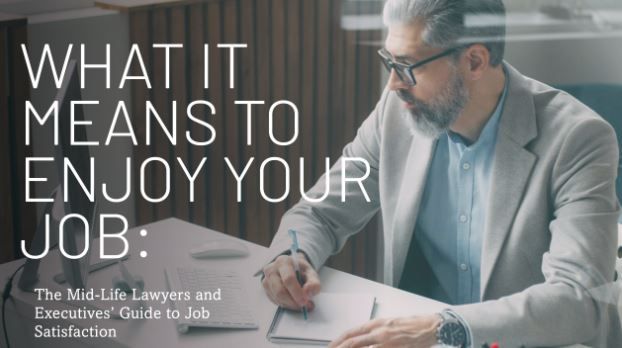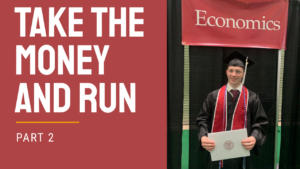Talk is Cheap. It’s Results that Count.
We give a lot of advice in this bi-weekly missive about how to conduct an effective job search and how to get out of your own way and find a high-paying career that you actually enjoy. But talk is cheap. Does what I teach, preach and impart to clients really work?
Yes, it does. (You expectedme to say that, didn’t you?)
The truth is I am researching how Artificial Intelligence is impacting job search and hiring. I had planned to write about that this week, but I am still neck deep in research. Since I am not ready to write about AI and needed a topic for today’s newsletter, I started looking on my PC for potential topics. Fortunately, I stumbled across these Career Strategies stories and comments from clients.
I am happy to share them with you now.
* Using what he learned from our program, at our insistence a client reached out to a former law firm colleague he didn’t like, didn’t get along with, and had said bad things about when they worked together. The former colleague was actually glad to hear from our fellow! Several weeks later, the colleague called and said he had a client who was looking for someone with our man’s experience. The hiring company did a series of interviews with our client, including flying him overseas to meet with their Board. Our client walked away with a post as US General Counsel at a compensation package nearly six times what he had been earning in a law firm practice!
* Our client was interested in transitioning from litigation to Professional Development. There was a major annual Professional Development conference in Washington, D.C. that we felt could have been a bonanza for our client, but the conference was very expensive. We looked at the numbers with our client, did our ROI estimate, and recommended they spend the bucks.
I then did some networking for my client and called a “graduate” of mine who had transitioned from law firm attorney to professional development executive years before. (BTW, “graduate is a term I use for my clients who successfully obtain new positions. Most of my clients become “graduates.”) Not only did my former client say he would be happy to help my current client, he said he was a featured speakerat the event and in fact, had obtained his first professional development job years prior by following our advice and going to the conference, when he met people that led him directly to a career change.
* This isn’t a success story per se, but attests to the power of what we teach. Our client said he learned that we were right: “If you are going to tell them you can solve their problems, you damn well better know what their problems are before you say you can solve them. What I learned from you is that you have to do your homework before interviewing with a company.”
This seems self-evident, but there’s more to it than meets the eye. When I am putting a marketing campaign together for a client, it is very detailed and thorough. It contains action items, talking points and much more. When clients use a line like “I can help solve your problems,” I make them prove it. I put them through what I call “the interview from hell,” and make them support their claims. I will do this with a client multiple times until they come up with answers that will impress a senior business leader. I will not accept slovenly intellectual thinking, nor will the decision-makers who hire my clients. Part of what we bring to the dance here is that I have run businesses or corporate business units for many years, and understand what it takes to be successful.
* This last client is not a graduate yet – as of today – but has two firm offers and one we feel will be coming in within the next few days. Getting three offers sounds great, but it can be very hard to pick the best one. We help with that very critical process by providing objective, non-emotional evaluation of the options. Here’s part of what my about-to-be graduate told me:
Fiest, I want to thank you. The “cold call” e-mail I sent to the GC/VP of (Company Name Deleted) didn’t initially yield anything until…he called me out of the blue. He said he saw my communication (a pitch letter and resume we had written for my client) and wanted to know what I wanted. So I told him! We had a good dialogue, but there were no openings. Then he called this month and said that is about to change. They have decided to go through a reorganization.
Second, you were right. They don’t advertise these positions. You have to get on the radar before that. Your method works – even for lawyers!
Third, I just had my first-round interview with the GC/VP. I think it went quite well. He is reorganizing the legal department in 3 weeks, after which the interview process will continue. He explained he is not the sole decision maker. I will interview with other VPs (marketing, sales, etc.). He said I should be prepared to speak with non-lawyers from (Location Deleted), who are very smart businesspeople but have no patience for legalese. I told him – who does, other than other lawyers?
“Anyway, I wanted to express my gratitude. Whether or not I land this gig, I am grateful.”
[Editor’s Note: This is the offer that is pending, but the other two offers are in hand.]
Please note that these are actual cases of people who have worked with me. I am not creative enough to make up stuff like this. If I were, I’d be in Hollywood writing screenplays! Nah, not really. I have found my niche and love what I do. I can help you feel the same way.
If you are an attorney and you’ve been thinking about exploring your career options and/or discovering “what else is out there” for you, feel free to contact me. If you are not sure how to even start the job search process, then by all means get in touch with me today for a virtual cup of coffee. You will receive a confidential, no-cost consultation to discuss your situation and goals, and will also get some expert advice on launching your job campaign.
If you would like to continue receiving Beyond the Bar Newsletter every 2 weeks, make sure to hit subscribe to stay up to date. If you have any questions about your career, click here
















